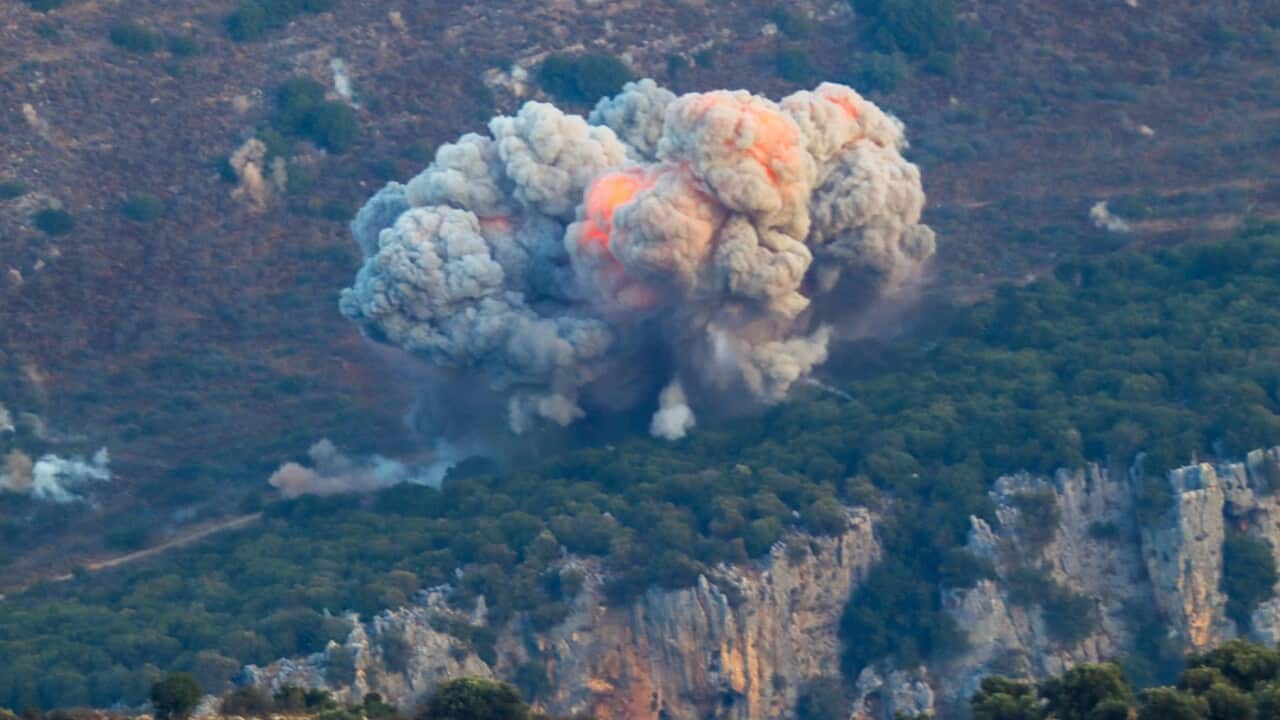TRANSCRIPT
Another day, another round of destructive attacks between Israel and Hezbollah.
Lebanese authorities say almost 600 people have been killed this week by Israeli strikes as the Israeli military opens up a second front in its war with the Palestinian militant group Hamas.
The Israel Defence Forces hit multiple targets across the country including in the capital Beirut.
This woman was one of many forced to flee their homes.
"People left their villages, left their homes. No words can explain this situation. What do you expect from people leaving their villages, leaving their homes here at schools. They are just crying, I am crying too."
Israel’s leader Benjamin Netanyahu, believes the current offensive is making progress towards his goal to turn the balance of power away from Hezbollah.
He wants to stop Hezbollah firing rockets over the border into Israel.
The Israeli military says the plan is to force Hezbollah back from the border and to destroy military facilities that threaten Israel.
And despite the civilian casualties, Israeli Defence Minister Yoav Gallant says the I-D-F will continue to target Hezbollah.
"A few words about the enemy we face – Hezbollah today is not the same Hezbollah we knew a week ago. (Hezbollah) has suffered a sequence of blows to its command and control, its fighters, and the means to fight. These are all severe blows. I trust the IDF and everything it does and we have more strikes ready."
At the United Nations General Assembly in New York, the Secretary-General Antonio Guterres [[goo-TAIR-esh]], again called for a ceasefire as he warned of the risk of a regional war.
"Gaza is a nonstop nightmare that threatens to take the entire region. Look no further than Lebanon. We should all be alarmed by the escalation. Lebanon is at the brink. The people of Lebanon, the people of Israel and the people of the world cannot afford Lebanon to become another Gaza."
Also at the UN for the last time is outgoing U-S President Joe Biden.
In his final speech, the foreign policy veteran called for a diplomatic solution to end the bloodshed and for both sides to pull back from the brink in Lebanon.
"Since October 7th, we've also been determined to prevent a wider war that engulfs the entire region. Hezbollah, unprovoked, joined the October 7th attack, launching rockets in Israel. Almost a year later too many on each side of the Israeli- Lebanon border remain displaced. Full scale war is not in anyone's interest. Even if the situation has escalated, a diplomatic solution is still possible. In fact, it remains the only path to lasting security to allow the residents from both countries to return to their homes and the border safely. And that's what we're working tirelessly to achieve."
Foreign Minister Senator Penny Wong told SBS her thoughts are with Lebanese-Australians as the conflict between Israel and Hezbollah continues.
"The numbers in relation to Lebanon are much higher than anything that we have seen in our evacuations out of Sudan or Israel, or those we have taken from Gaza. So, these are very large numbers of Australians who are in Lebanon, which is why the Prime Minister and I have been calling for some time for people to leave. I would urge people, if you are able to leave by other means, please do so."
Senator Wong says Australia's voice is among one of many in the international community calling for de-escalation of the conflict.













